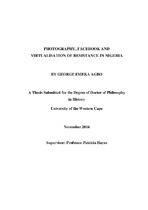Photography, facebook and virtualisation of resistance in Nigeria
Abstract
Nigerian post-independence history (1960 to the present date) is steeped in socio-political upheavals. The majority of the citizens are frustrated with the injustice, inequality and fraudulent politics that pervade the country. The central argument of this thesis is that these conditions are critiqued through the photographic practices produced on Facebook. Through the circulation of photographs and the conversations around them on the social media platform, Nigerians demand social change. The sociality that underpins the visuality of social networking is explained by Ariella Azoulay's notion of "civil discourse," which theoretically organises the thrust of this thesis. The formulation suggests that the photograph is an outcome of the interaction among many individuals. It is a site of exchange, a process which I have argued to be reinforced by digital and internet technology. For five years, I have followed the visual social production on Facebook in the context of virtual participant observation, downloading photographs and the comments that go with them. A number of the photographs and the accompanying comments are analysed with semiotic tools to understand the key concerns of Nigerians. To explain how the agitation is presented, and the efforts invested in the production, I have reflected on the related questions of technological mediations and appropriations. A network of digital infrastructure conditions the creation and editing of the photographs and their dissemination and meaning-making processes on Facebook. Again, the Nigerian example demonstrates how state failure fuels activism, insurgency and counter-insurgency, all of which are actuated by digital photographic production. In this situation, the photographic image is burdened with the task to produce violence and to counter it. What ultimately emerges are complex relations among people, photography and technology. I conclude that the virtual movement presents possibilities for socio-political transformation in Nigeria. From the perspective of photography, this thesis contributes to the debates in social media activism and how it is shaping politics in Africa. It demonstrates the possibility of reading the tensions in an African postcolony through the connected digital, visual and social practices of the ordinary people. We are prompted to acknowledge the influence of digital infrastructure in the political use of the image.

